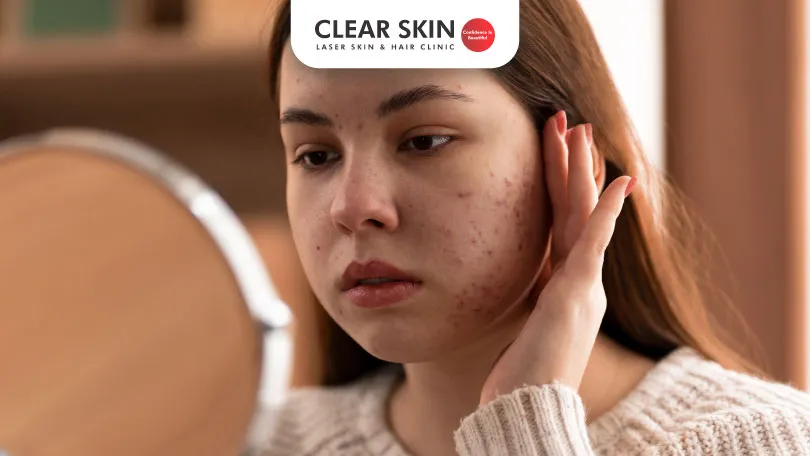Reviewed By:
Updated on: 13th February,2023
This article explores effective treatments for acne scars, focusing on Glycolic Acid and Isotretinoin. It discusses their benefits, side effects, and suitability based on different scar types. Readers gain insights into managing acne scars through these dermatological approaches, emphasizing the importance of consulting with a dermatologist for personalized treatment plans.

Table Of Content
- Do Glycolic Acid and Isotretinoin help Treat Scne Scars?
- What Causes Acne on the Skin?
- Glycolic Acid for Acne
- Side-effects of Glycolic Acid
- Isotretinoin for Acne?
- When to Consult a Dermatologist?
- Conclusion
Do Glycolic Acid and Isotretinoin help Treat Acne Scars?
Acne on the skin can take the form of small bumps or oozing pimples depending upon the nature of the occurrence. While some individuals have acne-prone skin, others can get acne due to various external and internal factors. Usually, skincare specialists recommend 2 major ingredients for the treatment of acne scars – Glycolic Acid and Isotretinoin. These can be available as standalone skincare products or recommended to you by your dermatologist in the form of pills or ointments.
In this article, we will understand how acne scars are formed and how Glycolic Acid and Isotretinoin can help with their individual properties. So let’s move on to the next segment to know more.
What Causes Acne on the Skin?
Acne scars: Types,Cause & Treatments (English)
Acne Scars Causes and Treatment
The reasons for acne and scars on the skin can vary from person to person. Ideally, these are the major reasons behind acne scars for most skin types:
- Genetic Disposition: If you are born with oily or acne-prone skin, minor zits and bumps are common throughout all seasons. Medication can help bring it under control, however, it is best to let the skin heal naturally.
- Dryness/Dehydration: Excessive dryness can cause the sebum glands in the skin to produce more oil. This can cause acne on the skin. Similarly, if the skin lacks water, it can get dehydrated and produce acne that leaves scars after the healing period.
- Allergies to new skincare ingredients: With so many rising brands in the market, it is natural to want to try new products. However, not all ingredients suit all skin types. Your skin might react and break out leaving lasting acne and scars.
- Picking on acne: You need to let acne fade on its own in order to let your skin heal. Often while the acne becomes hard enough, you might want to itch or pick on it. Doing so can cause marks or scars.
Having understood the root causes of acne, let’s understand how isotretinoin and glycolic acid for skin can help you heal acne scars.
Glycolic Acid for Acne
MDA is basically an invasive procedure commonly used to improve the skin structure. It rejuvenates the skin as well. MDA acts great in the treatment of an uneven skin tone. The device has a special applicator with an abrasive surface. This abrasive surface gently removes the thick outer layer of the pigmented skin and helps in making the skin even-toned. MDA is the safest treatment.
Side-effects of Glycolic Acid
Isotretinoin for Acne?
Isotretinoin is an oral medicine which is prescribed by a dermatologist in controlling active acne lesions. It is an oral medicine that is prescribed to have good control on new acne lesions by controlling the activity of sebaceous glands. This medicine has to be taken under the supervision of an expert dermatologist.
It is important to take caution while consuming isotretinoin for acne scars since not all patients are good candidates for this dermatologically-approved pill. There are various isotretinoin side effects that you must consider.
Some common side effects include experiencing – photosensitivity, dryness, irritation, and redness on the skin. Patients with abnormal LFT levels can not take isotretinoin. It is strictly contraindicated in pregnancy. Again not every patient with Acne will need oral isotretinoin. Due to this, it is always better to consult your doctor to know whether you really need isotretinoin or if your problem can be improved without oral isotretinoin & other topical medicine.
If taken in combination with other treatment modalities, it helps to counter severe acne including cystic acne or nodules. It might also help to treat some types of skin cancers.
For more details on an effective acne scar regimen, consult with your dermatologist for a treatment plant.
When to Consult a Dermatologist?
Conclusion
Popular Q&As
Learn how glycolic acid and isotretinoin can help treat acne scars. Dark lips can be caused by sun exposure, dehydration, smoking, or lifestyle factors. Understand the reasons and find expert solutions at Clear Skin Clinic, Pune. Diet plays a good role to decrease melanin in your body.
Tips for Fair and Glowing Skin for Oily Skin Types
Why are my lips dark?
How to Reduce Melanin Production in Skin Naturally?
We Got Your Back! Ask Us Anything On Your Mind!
Reach out to us on
Didn’t Find What You Were Looking?
Please Contact Us.
We are committed not only to treating you, but also educating you.

